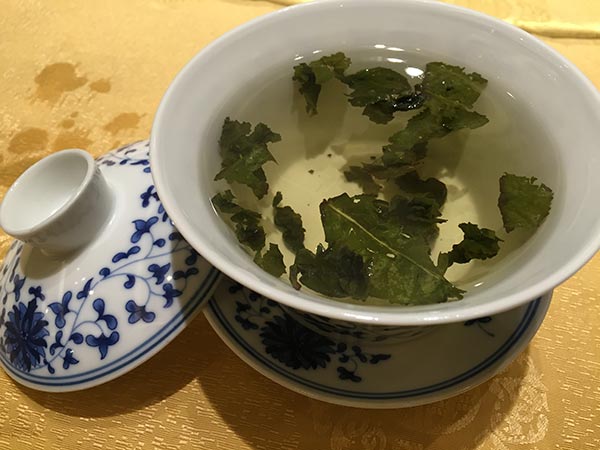A long-running and delicious social tradition
 |
|
Guyuelou restaurant featuring a cup of tea and dozens of local dim sum offerings gives a glimpse into the morning tea culture in Taizhou, Jiangsu province. [Photo by Yang Feiyue/China Daily] |
We opt for Tieguanyin, which is fresh with a rich, lush flavor. The name literally means "Iron Goddess of Mercy", and there are different legends behind the tea, a prized oolong black tea from Fujian province that requires more than a dozen steps to produce. Rich in health-promoting anti-oxidants, the tea has a floral aroma and a soothing minerality on the palate.
The first cold dish we choose is a dish made of local eels, which are deep-fried but retain a resilient texture. Only pepper and salt are added before frying.
Next comes the dried bean curd, which offers a flashy demonstration of the chef's extraordinary chopping skills. Consistently thin shreds of tofu and ginger, chopped-up red pepper and pork, and Chinese parsley (coriander) are nicely arranged in a bowl; we are urged to add a spoonful of secret-recipe gravy before tasting the mixture. The tofu shreds are tender and taste like soft noodles.
There is a wide range of dim sum, including buns stuffed with crab meat or soup, pork, and a local plant bur clover.
The crab and pork flavors complement each other, and the buns offer a lusher taste compared to their siblings, the crab soup buns, which are a treat to the eye.
The buns sit flat-bottomed on a tray, with crepe-thin wrappers filled with crab soup. One bite opens the door to fresh soup, with bits and pieces of delicious crab meat.
The bur-clover buns seem to redefine "green". I don't remember seeing anything greener than this stuffing, which is surprisingly smooth in the mouth. Bur clover is a good source of protein; it is very similar to alfalfa but there is less fiber and somewhat more fat and protein. The plant is a forage crop in the United States, and it is widely planted in the West as a cover crop to replenish nutrients in soils, especially on organic farms.
All the buns have a soft yet springy wrapper that is slightly chewy. Don't worry if you find these buns to be a little cloying. One sip of the Longjing tea will immediately offset the relative greasiness.
The fish soup noodle's simple appearance belies the hard work involved. Fresh wild crucian carps are first fried with ginger, onion and pepper before being stewed with eel and pig bones for a couple of hours. The soup is sweet and with a pleasant fish aroma.
"The morning tea tradition reflects the locals' pursuit of a quality life and health preservation," Hu says.
Some of the morning-tea restaurants in the Old Street area have preserved storytelling performances, offering visitors a taste of the old leisurely life.
Normally the tea breakfast lasts till 10 am at Guyuelou, but the restaurant can offer the treat late in the day for visitors from afar.
If you go
Guyuelou
100 Old Street, Hailing district, Taizhou, Jiangsu province. 523-8615-7777.
















